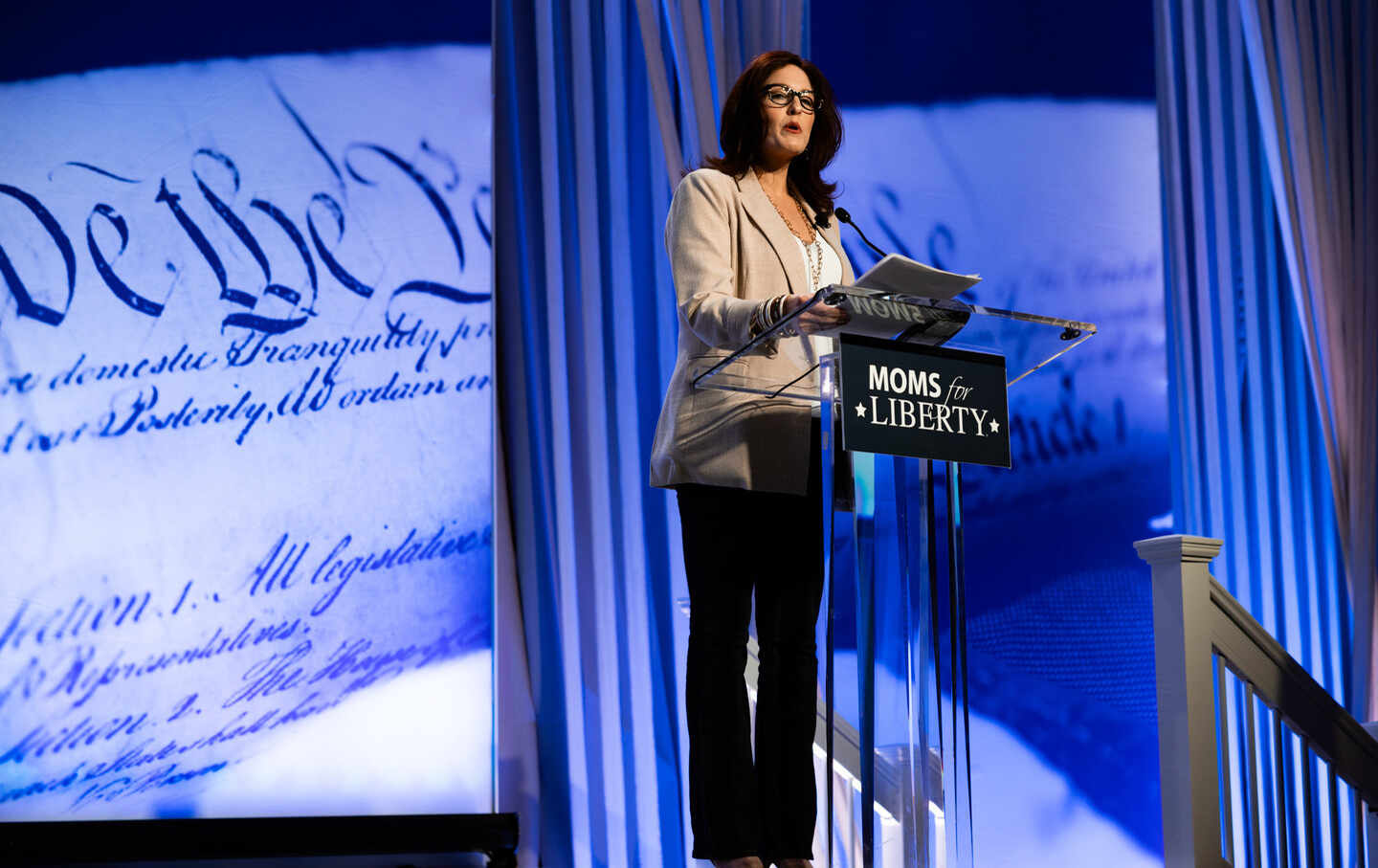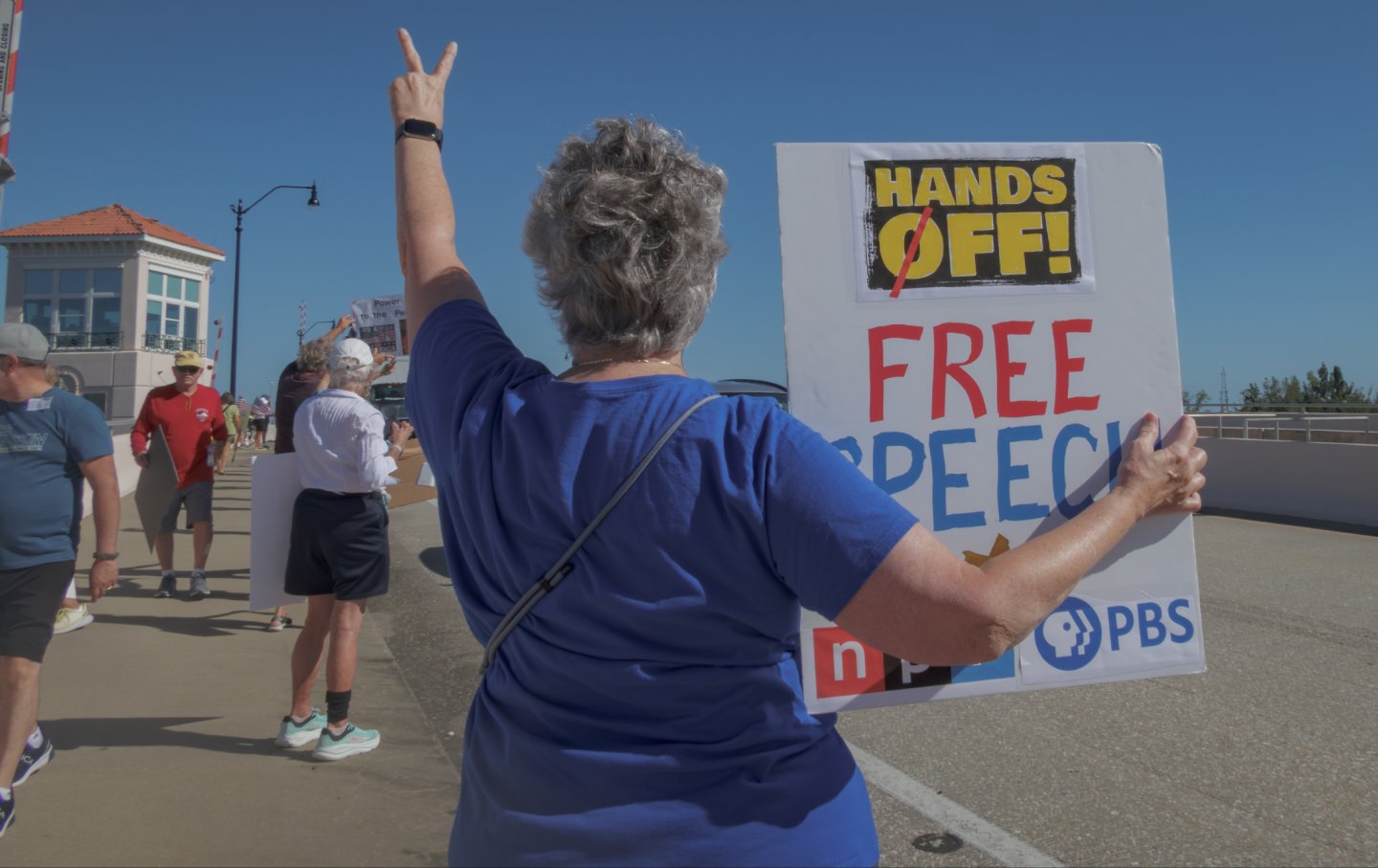Feminists, Rape, and Hamas; Plus Moms for Liberty
On this episode of the Start Making Sense podcast, Katha Pollitt talks about the failures of women’s groups, and Randi Weingarten comments on culture war over the schools.

Here's where to find podcasts from The Nation. Political talk without the boring parts, featuring the writers, activists and artists who shape the news, from a progressive perspective.
Why have American feminist groups been slow to condemn rapes of Israeli women and girls by Hamas? that’s the question posed by Katha Pollitt, The Nation's award-winning columnist.
Also: They call it “the parents’ rights movement.” we call it a culture war against public education. It failed as a Republican election strategy in 2023, but what about 2024? Randi Weingarten has our analysis – she’s president of the AFT.
Our Sponsors:
* Check out Avocado Green Mattress: https://avocadogreenmattress.com
Advertising Inquiries: https://redcircle.com/brands
Privacy & Opt-Out: https://redcircle.com/privacy

Cofounder of Moms for Liberty Tiffany Justice speaks ahead of former US president and Republican presidential candidate Donald Trump at the Moms for Liberty Summit in Philadelphia, Pa., 2023.
(Hannah Beier for the Washington Post)Why have American feminist groups been slow to condemn rapes of Israeli women and girls by Hamas? That’s the question posed by Katha Pollitt in a recent column. She’s on the podcast to discuss.
Also on this episode: They call it “the parents’ rights movement.” We call it a war on public education. It failed as a Republican election strategy in 2023, but what about 2024? American Federation of Teachers President Randi Weingarten is on the show with her analysis.

Here's where to find podcasts from The Nation. Political talk without the boring parts, featuring the writers, activists and artists who shape the news, from a progressive perspective.
Republicans are about to end Obamcare subsidies, driving up premiums for 20 million people during the year of the midterm elections. How have they managed to end up after all these years with no health insurance plan of their own? John Nichols comments.
Also: Bob Dylan’s earliest recordings have just been released—the first is from 1956 when he was 15 years old—on the 8-CD set ‘Through the Open Window: The Bootleg Series vol. 18” – which ends in 1963, with his historic performance at Carnegie Hall. Sean Wilentz explains – he wrote the 120 page book that accompanies the release.
Our Sponsors:
* Check out Avocado Green Mattress: https://avocadogreenmattress.com
Advertising Inquiries: https://redcircle.com/brands
Privacy & Opt-Out: https://redcircle.com/privacy
Jon Wiener: From The Nation Magazine, this is Start Making Sense. I’m Jon Wiener. Later in the show, they call it the parents’ rights movement. We call it a culture war against public education. It failed as a Republican election strategy in 2023 but what about 2024? Randi Weingarten has our analysis, she’s president of the AFT. But first, feminists and rape, the case of Hamas. Katha Pollitt will comment in a minute.
[BREAK]
Why have American feminist groups been slow to condemn rapes of Israeli women and girls by Hamas? That’s the question posed by Katha Pollitt at thenation.com. Katha, of course, is a poet, essayist, and award-winning columnist for The Nation. She also writes for The New York Times, The Atlantic, and The New Yorker. We reach her today at home in Manhattan. Katha, welcome back.
Katha Pollitt: Hi, Jon, thanks for having me on the show.
JW: Let’s review where we are today. We’re speaking on Tuesday, December 19th. Since October 7th when Hamas killed 1200 Israelis, almost all civilians, Israeli military forces have killed almost 20,000 Palestinians in Gaza, mostly women and children. Almost the entire population has had their homes destroyed. The Israelis have blocked shipments of food, water, and medicine, and fuel. We’ve been arguing for an immediate ceasefire for a couple of months now. Meanwhile, some American men are denying that Hamas members raped Israeli women and girls on October 7th. Who are some of the people making this claim and what exactly are they saying?
KP: Well, Max Blumenthal is one. He claimed in a tweet last week that “Israel is inventing stories of mass rape on October 7th,” and his colleague at The Grayzone news site, Aaron Maté, demanded to see “purported rape victims offering direct testimony.” Now, these women are dead or possibly kidnapped, and that is so much like what rape denialists always say. “It’s never good enough. She hasn’t given testimony.” Or, if she did, there’s something wrong with it. It’s astonishing to see this kind of denial is put to a political purpose, which is to side with Hamas against Israel. You can totally oppose what Israel is doing, and I do. I mean, almost 20,000 people are now dead, without denying that Hamas is a violent, terroristic, fundamentalist, misogynist group.
JW: Let’s just spend a minute, since there has been a call for evidence that Hamas members really did rape Israeli women. There is evidence.
KP: There’s a ton of evidence – and you can read all about it at Physicians for Human Rights–Israel. There are now eyewitness testimony reports from doctors and others who saw the bodies of women who had been sexually abused. There are photographs. You have to really be in a conspiracy mindset to dismiss all that as fabricated.
JW: But your main concern is not Max Blumenthal or Aaron Maté, your main concern is American feminist groups. Some of them have condemned rape by Hamas. You quote a statement from Planned Parenthood released on December 5th. “On October 7th, Hamas unleashed a brutal attack in Israel, killing over 1,000 civilians, sexually assaulting women and girls, and kidnapping over 200 people, many of whom remain captive.” How does that sound to you?
KP: Well, that’s very good. The thing is a lot of groups hung back. I mean, this horrible thing happened on October 7th. December 5th is almost two months later, and they came out after U.N. hearing, a U.N. session on these rapes so there was a lot of pressure on them. And then, I had problems with some of the things they said.
JW: Well, yeah, let me look at some of the other groups. The National Organization for Women on November 30th issued a press release in which the national President said, “Rape must never be part of a battle plan,” and she condemned what she called the “deafening silence around these widespread crimes against humanity.” How does that sound to you?
KP: Well, it sounds like a deafening silence because the words Israel, Hamas, and October 7th do not appear, so this is some vague, humanistic statement that is not attached to any actual event.
JW: And there’s worse. There are groups who haven’t said anything, even vague humanitarian statements. Want to name some of those?
KP: Yeah, so where’s the Women’s March? Where’s the National Association of Women’s Studies? Where is the feminist majority? It’s just very strange. I don’t quite understand it. Now, I will say some of these groups are, they’re kind of slow. They’re kind of – I don’t know that they have a whole lot of reach and energy, but how much reach and energy do you need to have to issue some kind of a statement condemning this?
JW: And you said there was a U.N. hearing. Who deserves credit for that?
KP: Oh yeah. Well, this is really kind of interesting. This U.N. session was called by Israel and the keynote speaker was our old friend, Sheryl Sandberg, who is the bête noire of progressive feminists for her book, Lean In, and her association with Meta, formerly Facebook. But you got to give her credit. She stood up there, she gave a very powerful speech, and she was on the case when a lot of people were not.
JW: If we ask why won’t they do this, you’ve already suggested that somehow people feel that condemning Hamas is failing to support the Palestinians. What do you say to those people?
KP: I think we have to somehow make some distinctions between the Palestinian people, who are being slaughtered in the most horrible ways, and Hamas, which is a terroristic group that hasn’t had an election in Gaza since they won the last election in 2006 or seven, and that’s pretty shocking. I mean, I think there’s a lot of pressure on people to take one side or another, and what I’m saying is you can take the side that what Israel is doing is truly atrocious. It’s a war crime. It’s just a whole bunch of atrocities that are happening, and that will have tremendous, terrible repercussions on Israel, to say nothing of the Palestinians, for a very long time. You can say all that and still say that raping women in war and killing them is not something that should happen.
JW: In conclusion, I’d like you to read the last paragraph of your column.
KP: I say: surely there is enough horror to go around, nationalism, tribalism, patriarchal religion, and I should add male supremacy. These are the enemies of women’s liberation, safety, and flourishing, and always have been. Women are being used and abused by both sides: Hamas is flagrantly misogynistic, and Israel’s current government wants to roll back women’s rights as fast as they can. To see feminists overlooking violence against women because of their allegiance to either Israel or Palestine makes a mockery of feminism. Virginia Woolf wrote, “As a woman, I have no country. As a woman, I want no country. As a woman, my country is the whole world.” A noble thought—whatever happened to it?
JW: Katha Pollitt: read her at thenation.com. Katha, thanks for talking with us today.
KP: Thanks so much for having me on the show.
JW: Now it’s time to talk about school politics in the 2023 election and in the 2024 election. For that, we turn to Randi Weingarten. She’s president of the AFT, the American Federation of Teachers, with more than 1.7 million members and more than 3,000 locals nationwide. We reached her today in Jacksonville, Florida. Randi Weingarten, welcome to the program.
Randi Weingarten: It is great to be with you, Jon.
JW: We need to talk about American politics and about what they call the Parents’ Rights Movement. We call it the right-wing culture war. It failed as a Republican election strategy in 2023, but what about 2024? So my first question for you is what is Moms for Liberty? They say they’re just ordinary moms and that their group is grassroots and nonpartisan.
RW: Moms for Liberty is now going through a big existential crisis because one of its founders, or the husband of one of its founders, who happens to be the head of the Republican Party in Florida, so, so much for non-partisanship, is in a bunch of trouble for accusations of sexual assault. And so we’re going to see in the next few weeks whether Moms for Liberty is still a thing given this is now going on. But Southern Poverty Law Center has called them an extremist group. I am sure that in some of the chapters all across America, there are moms and dads who just saw Moms for Liberty or the 1776 Project or some of these other groups, they said they saw something in there that they wanted to align with because of what was happening over the course of the last three years in America. COVID changed so much in America, and shame on us for not recognizing that.
We often go immediately to the politics of how did Trump handle it, or how does Biden handle it, or what is going on? Should schools have been open more quickly or not? But the bottom line is, in 2020, you started having a pandemic the likes of which we had not had for a hundred years, and it was invisible, and people didn’t know what to do about it, and they didn’t know how to treat it, and they didn’t know how to mitigate it. And so we had a mess on our hands, including a million deaths, including thousands of kids who were orphaned from March, April, May, June, and on and on and on.
And so you are seeing the effects of this even today in the creation of a Moms for Liberty or other types of things, because of the anxiety that parents had about what was going on with their kids and schools being closed. So I would say that what you saw in these last elections in 2023, and I would argue we’ll see it in 2024 now, is what we started seeing in 2022, which is that we started being able, by January 2021 on, we started being able to have schools be centers of community again, have schools respond to loneliness and learning loss and all of this anxiety.
And so that’s what schoolteachers do. That’s what the pro-public education forces do. And so not a surprise to me that parents and teachers together are real allies of each other. And as time has gone on, the pro-public education forces are winning again. But this goes back to what Moms for Liberty and all these DeVos-inspired groups and others are. You saw it from what Rufo and DeSantis and the other dividers have said, they exploited the fear that people had during COVID and post-COVID. And for that, that’s where you hear my anger. Not that that fear existed, it existed all over, but how do these groups who hate public schools and want this division, they exploited this. And it’s made it harder. Teachers have had to work double and triple time, not only on the mental health issues and the loneliness issues and the learning loss issues, but literally banning books, censoring curriculum, toxifying terms like CRT, like making trans kids bad. All of this was an exacerbation of the anxiety and fear. And what I think the 2023 election showed us is that things are turning around again.
JW: I understand the AFT tracked something like 250 races, that’s state, local, and school board elections, where right-wing candidates campaigned on their school issues. How many of the AFT candidates won?
RW: About 80%.
JW: 80%?
RW: Yeah. And what you saw, Jon, was the PTAs don’t get involved in elections. They don’t get involved. So you saw lots of new groups crop up. Moms Rising, Campaign for our Shared Future, Red Wine and Blue, and lots of other groups pop up, and those groups and teacher groups, NEA, ourselves, others, working together to support the pro-public education, pro-kid, pro-family, pro-humanity candidates. And 80% of them won.
JW: I looked at the list of where the victories were. They were of course in a lot of blue states, but not just the blue states. Iowa was a big state for liberal candidates running for school board. Ohio, generally thought of as a red state. Why do you think people who vote for Republicans for governor and senator did not vote for the Republican-endorsed candidates in school board races?
RW: I think it’s because we have to focus on the values as opposed to the labels. And when people start focusing on the values, how are we going to help your kid have a good education, have opportunity? How are we going to deal with the social media companies and the fixation on a device instead of the fixation on relationships? How are we going to make school fun? How are we going to make it engaging? How are we going to meet the needs of your kids? That’s not a Republican issue or a Democratic issue, or it shouldn’t be. But what has happened over the course of the last few years, and DeVos is a perfect example of it, that division and smear and calling people names and trying to actually defund public education, that’s become the Republican playbook. Look at what’s now happened in Texas. Four times, Governor Abbott has tried to create vouchers in Texas. Four times in the last year. Four special sessions. And they have, Republicans have the majorities in the legislature, but rural Republicans combined with urban Democrats said, “No, we need our public schools.”
And so what’s happened is that, just like on so many other issues, the MAGA Republicans, the extremists that are housed in the Republican Party, they don’t really represent parents on the ground. And if you can focus on the values and the needs, not the labels, then pro-public education people win.
JW: Republican strategists have noticed how poorly their school board candidates did in 2023. And there’s talk among Republican strategists that those defeats suggest the candidates that they’re running in 2024 should not focus on ‘wokeism’ but make it more about charter schools, about parents’ rights. And several Republican candidates are planning to do that in 2024. I understand there’s a bill in Congress, the Educational Choice for Children Act, that has more than 140 Republican co-sponsors in the House and Senate that would provide $10 billion in tax credits. What do you think is going to happen to school choice, as they call it, charter schools as an issue in 2024? Is it going to be as big as it seems it will be right now?
RW: Look, notice what’s going on here. As opposed to simply trying to invest in the public schools that 90% of kids go to, they’re constantly trying to undermine them, and that in and of itself is the problem. Public schools are not Democratic or Republican. They’re not conservative or liberal. They are about opportunity, and frankly, I would argue, pluralism. They are a foundation stone to our democracy and they’re absolutely imperative for students’ opportunity.
I was just in Jacksonville the last couple of days, and in other rural, basically conservative areas around Jacksonville that routinely vote for Republicans. So when you go into classrooms and you’re trying to help kids be excited about Career Tech Ed, about experiential learning, about hands-on learning, about working with each other, about reading books, this is what Congress should be helping us do. And instead, it’s not that bill that is – that bill may have a hundred some odd signatures, but the thing that was most antithetical to me is that they’re also trying to cut Title I, the most important funding for poor kids in rural areas and in urban areas. They’re trying to make an 80% cut to the funding that goes into public schools for poor kids. I’m constantly shocked that instead of actually helping the 90% of kids that go to public schools, many of whom are Republicans, they want to keep on taking money out and keep on smearing us instead of helping us help all the kids in America.
JW: Last question. The Republican slogan here is parents’ rights. What about the idea of parents’ rights? What kind of rights do you think parents have when it comes to their own kids’ education?
RW: So let me tell you a secret that’s going to go to this podcast for all the folks who listen to your podcast. We all need parents’ rights. Any teacher will tell you our most important partners are parents. We want parents to be involved in schools. We need them to be involved in schools. How many times when I taught did I have a contract with my high school kids and I wanted them to bring it home, not just them sign it, but have their parents sign it so that parents knew what I was teaching and they were part of my teaching? We need that. How many times have we begged parents to be at parent-teacher night? We need that. We need parents to be our partners.
And so it’s, again, the constant attempt to smear and to divide instead of solve. We want parents to be involved in schools. We need that to happen. But the other thing I would say is this. For every time that one of these groups, take Florida for example, 60% of the book banning was done by 11 people. 60%. So every time they attempt to ban a book, what about all those other parents and kids that want a book to be there? So they’re taking away other people’s freedom. So for the party that says they believe in freedom, why don’t you believe in everybody’s freedom?
JW: Randi Weingarten is President of the American Federation of Teachers. Randi, thank you for all your work – and thanks for talking with us today.
RW: Thanks, Jon.
Subscribe to The Nation to Support all of our podcasts
Disobey authoritarians, support The Nation
Over the past year you’ve read Nation writers like Elie Mystal, Kaveh Akbar, John Nichols, Joan Walsh, Bryce Covert, Dave Zirin, Jeet Heer, Michael T. Klare, Katha Pollitt, Amy Littlefield, Gregg Gonsalves, and Sasha Abramsky take on the Trump family’s corruption, set the record straight about Robert F. Kennedy Jr.’s catastrophic Make America Healthy Again movement, survey the fallout and human cost of the DOGE wrecking ball, anticipate the Supreme Court’s dangerous antidemocratic rulings, and amplify successful tactics of resistance on the streets and in Congress.
We publish these stories because when members of our communities are being abducted, household debt is climbing, and AI data centers are causing water and electricity shortages, we have a duty as journalists to do all we can to inform the public.
In 2026, our aim is to do more than ever before—but we need your support to make that happen.
Through December 31, a generous donor will match all donations up to $75,000. That means that your contribution will be doubled, dollar for dollar. If we hit the full match, we’ll be starting 2026 with $150,000 to invest in the stories that impact real people’s lives—the kinds of stories that billionaire-owned, corporate-backed outlets aren’t covering.
With your support, our team will publish major stories that the president and his allies won’t want you to read. We’ll cover the emerging military-tech industrial complex and matters of war, peace, and surveillance, as well as the affordability crisis, hunger, housing, healthcare, the environment, attacks on reproductive rights, and much more. At the same time, we’ll imagine alternatives to Trumpian rule and uplift efforts to create a better world, here and now.
While your gift has twice the impact, I’m asking you to support The Nation with a donation today. You’ll empower the journalists, editors, and fact-checkers best equipped to hold this authoritarian administration to account.
I hope you won’t miss this moment—donate to The Nation today.
Onward,
Katrina vanden Heuvel
Editor and publisher, The Nation






